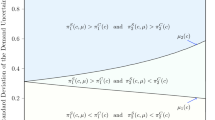Abstract
We consider the collective incentives of buyers and sellers to form cartels in markets with decentralized trade and pairwise bargaining. Cartels are coalitions of buyers or sellers that limit market participation and compensate inactive members for their abstention. In stable market outcomes, cartels set Nash equilibrium quantities and cartel memberships are immune to deviations. The set of stable market outcomes is non-empty and its full characterization is provided. Stable market outcomes are of two types: (i) at least one cartel restrains trade and market participation is balanced; (ii) only one cartel is active and it reduces trade slightly below the opponent’s.
Similar content being viewed by others
References
Bloch F, Ghosal S (2000) Buyers’ and sellers’ cartels on markets with indivisible goods. Rev Econ Des 5: 129–147
Bogomolnaia A, Jackson MO (2002) The stability of hedonic coalition structures. Games Econ Behav 38: 201–230
Burani N, Zwicker W (2003) Coalition formation games with separable preferences. Math Soc Sci 45: 27–52
D’Aspremont C, Jacquemin A, Gabszewicz JJ, Weymark J (1983) The stability of collusive price leadership. Can J Econ 16: 17–25
Donsimoni MP, Economides NS, Polemarchakis HM (1986) Stable cartels. Int Econ Rev 27: 317–336
Galbraith JK (1952) American capitalism: the concept of countervailing power. Houghton Mifflin, Boston, MA
Horn H, Wolinsky A (1988) Worker substitutability and patterns of unionisation. Econ J 98: 484–497
Inderst R, Wey C (2003) Bargaining, mergers, and technology choice in bilaterally oligopolistic industries. RAND J Econ 34: 1–19
Lagos R (2000) An alternative approach to search frictions. J Political Econ 108: 851–873
McAfee P, McMillan J (1992) Bidding rings. Am Econ Rev 82: 579–599
Moreno D, Wooders J (2002) Prices, delay and the dynamics of trade. J Econ Theory 104: 304–339
Ponsati C (2004) Search and bargaining in large markets with homogeneous traders. Contribut Theor Econ 4:1. http://www.bepress.com/bejte/contributions/vol4/iss1/art1
Ray D, Vohra R (1999) A theory of endogenous coalition structures. Games Econ Behav 26: 286–336
Rubinstein A, Wolinsky A (1985) Equilibrium in a market with sequential bargaining. Econometrica 53: 1133–1150
Scherer F, Ross D (1990) Industrial market structure and economic performance, 3rd edn. Houghton Mifflin, Boston, MA
Snyder CM (1996) A dynamic theory of countervailing power. RAND J Econ 27: 747–769
Stigler GJ (1954) The economist plays with blocks. Am Econ Rev 44: 7–14
Stole LA, Zwiebel J (1996) Organizational design and technology choice under intrafirm bargaining. Am Econ Rev 86: 195–222
von Ungern-sternberg T (1996) Countervailing power revisited. Int J Indus Org 14: 507–520
Wooders J (1997) Equilibrium in a Market with intermediation is walrasian. Rev Econ Des 3: 75–89
Author information
Authors and Affiliations
Corresponding author
Rights and permissions
About this article
Cite this article
Burani, N., Ponsati, C. Countervailing power? Collusion in markets with decentralized trade. Rev Econ Design 15, 91–120 (2011). https://doi.org/10.1007/s10058-009-0093-8
Received:
Accepted:
Published:
Issue Date:
DOI: https://doi.org/10.1007/s10058-009-0093-8
Keywords
- Decentralized trade
- Pairwise bargaining
- Bilateral cartel formation
- Cartel stability
- Countervailing power



